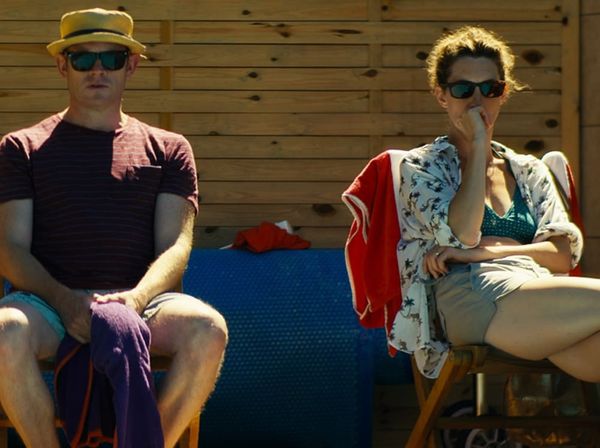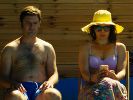Eye For Film >> Movies >> The Black Forest (2019) Film Review
The Black Forest
Reviewed by: Anton Bitel

There have been two recent films called The Black Forest, only one of which was horror. You might expect the horror film to have been this one, written and directed by Ruth Platt, not least because her feature debut was The Lesson (2015), a highly literate take on the prison-house of class (in both senses of the word) that invested the tropes of 'torture porn' with social realism and a certain didacticism. In fact, though, it was the Coffin Joe-riffing pandemonium of Rodrigo Aragão's The Black Forest (A Mata Negra, 2018) that delivered on the expectations of hard horror film, while Platt has instead turned to family drama, preferring the quieter dread of domestic dysfunction.
The premise is simple. In the wee hours of the morning, a family - Beth (Hattie Ladbury) and Darko (Aleksandar Mikic) and their children Theo and Milo - drive off from their Oxford home to join friends - Jack (Robert Hands, star of The Lesson), Maggie (Sirine Saba) and their children (Phoebe, Guy, Tabby and Caspar) - in a rented holiday home near Freiburg in Germany. As Darko, driving towards the EuroTunnel, describes to his inattentive children the massive geological shifts that, over millennia, created the channel separating England from the Continent, he is both commenting obliquely on, and providing a broader perspective for, the rifts and tensions that are dividing both Brexiting Britain and his own family (Beth is English, Darko is Macedonian).

These tensions are primarily economic - Darko has been having trouble at work, and he has invested what money they have in the production of a play by Beth. Now he is coming to the end of a legal dispute with his business partners, but some other bad news about his past financial dealings is bubbling to the surface, threatening to undo the family's fragile cohesion. If Darko is distracted, Maggie is even more so, her fixation on her smartphone making her an absent presence. Maggie has been engaged in an affair with an old schoolfriend, leaving her banker husband Jack lost and confused as he faces the breakup of his relationship and the dissolution of a family of six.
As the adults, all played by actors, engage in increasingly bitter recriminations and painful confrontations, the children, all effectively playing themselves, put in wonderfully naturalistic, unaffected performances as young people blithely unaware (or are they?) of the dramas unfolding between their parents. The two eldest children, Theo and Phoebe, spend time getting on together as they walk, sing, fish and idly chat about existential and theological issues which, like Darko's disquisition on geology, place all these small-scale human concerns into a much bigger picture. In particular, Theo posits the theory that our universe may be a simulation. Certainly the constructed world of The Black Forest is itself a kind of simulation in which Platt - herself, like Beth, a producer of theatrical productions (and now films) - is able to stage her themes in an imitation of life, and no doubt to exorcise a few personal demons through the cathartic effects of art. Realism is certainly the mode that Platt embraces here, crafting her film as though it were an intimate holiday video, and inviting viewers to be flies on the wall as these families fragment and are forced to address home truths.
The result is reminiscent of Joanna Hogg's Unrelated (2007) and Archipelago (2010), only set in a lower rather than upper middle-class bracket. For this is a vision of Englanders vacationing abroad, trying to relax from problems in the home counties, and facing their difficulties from a room with a view onto another world.
Reviewed on: 28 Jun 2019















